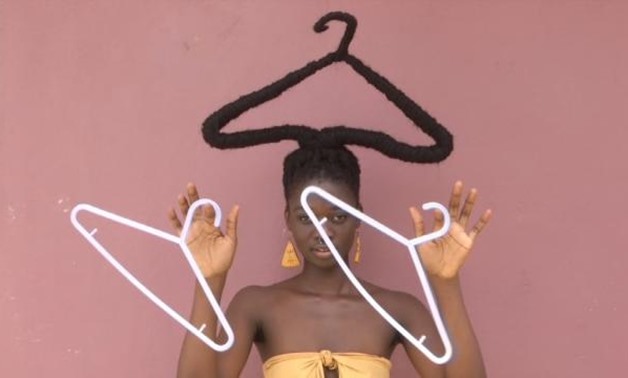
Ivory Coast artist makes sculptures from her own hair - Reuters
There’s almost no image Ivorian artist Laetitia Ky can’t sculpt from her own hair. Depending on her mood, she can shape her thick black tresses into light bulbs, trees, trumpets, bicycles or cupcakes.
What started out as a fun experiment has now turned into something of an occupation for the 21-year-old, as she seeks to use black hair as a medium for social commentary on topics such as feminism, pop culture and racism.
Ky thought of the idea when she came across an Instagram account showing photos of African women in traditional dress, with their natural hair arranged in eclectic styles.
“I was amazed by the hairstyles. I told myself: My God, how can we do this with hair?” the artist told Reuters at her flat in Ivory Coast’s commercial capital Abidjan.
Ky played with various props to shape her hair - from metal wires, to hangers and pieces of kaleidoscopic “African print” fabric. She posted photos of her work on social media and her popularity rose to more than 80,000 followers on Instagram and almost 35,000 on Facebook.
On a continent where many women hide their naturally “Afro” hair, often by stitching on wigs in so called “weaves”, celebrating black hair has become a political statement.
In January Ky posted a series of photos encouraging women to have a more positive perception of their bodies, with hairstyles designed to draw attention to curves and armpit hair.
“Highlighting black beauty is very important for me,” she said.
Last year, Ky also drew attention to the #MeToo campaign against sexual harassment when she sculpted her hair into the image of a man lifting a woman’s skirt, along with the story of a friend who had narrowly escaped rape.
A university graduate in commerce and administration, Ky only recently decided to focus on art. She started working on a fashion line this year.
Ky’s mother Aicha Sherif - who taught her daughter how to style hair - encouraged her daughter to pursue her dream, instead of trying to steer her into a more “stable” profession, as a more conventional middle-class parent might do.
“I knew telling her ‘no’ was out of the question,” Sherif said. “I also lived a similar experience. After graduation I also wanted to do design, but at the time, my parents did not see it that way.”

Comments
Leave a Comment